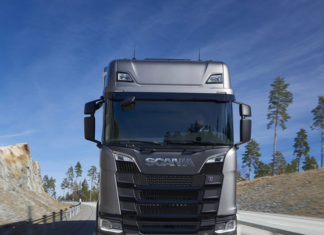The South African trucking industry has for some time been male-dominated, with little encouragement or opportunities given to women to infiltrate the tight male-dominated industry. Isuzu Truck South Africa aims to shift any misconceptions, negative connotations and stigma mounting over women being inadequate to take on various roles in the business of trucking.

“Embarking on a mission to introduce and enrol women into the business of trucking, Isuzu Truck South Africa joined forces with the Training Transport Academy to facilitate learnership and provide in-classroom training through qualified assessors,” says Kas Govender, Human Resources Manager, Isuzu Truck South Africa. After receiving 58 awe-inspiring applications for the learnership, only five women made the cut to the sought-after course that would see the women gain a holistic knowledge of all aspects in the business of trucking whilst earning the recognised National Certificate: Professional Driving qualification accredited by the Transport Education and Training Authority (TETA).
The Training Transport Academy opened its doors to the first female-only intake in February 2016. Six months into the course the programme has begun to yield a new breed of truck drivers armed with extensive knowledge of not just the art of driving, but in-depth expertise on the logistics of the industry.
Born and bred in Qunu, Eastern Cape is rural-raised Neziswa Dungayezi – a shy and reserved 29-year-old single mother to an 11-year-old girl – who is part of the inaugural five women to be enrolled in the Isuzu Truck women in the trucking business course initiative. After witnessing a female driver (whom she only remembers as S’mangele) drive up in a truck from KwaZulu-Natal to carry out deliveries in the local Spar she worked in, Neziswa was filled with admiration that a woman could effectively and effortlessly take on a male role that until then, she had never seen any women venture into. “It was at this moment I knew that my gender was the least factor to hold me back from what I had wanted to pursue. Determination, perseverance and encouragement were adequate for me to bolt in headstrong in a predominantly male industry and join men in the trucking business,” Neziswa comments. She states that she would encourage other women to pursue any career that their heart desires. “Sadly, being in the industry was also met with a lot of resentment from our male counterparts, who concluded that taking on a career in the trucking industry was an act of defiance to men and that women only wanted to take on their jobs,” adds Nesizwa. She further mentions that she has gained immense confidence in the duration of the course, attributing it to the Communication and Self Development classes offered as part of the learnership. Additionally, she is now well-articulated. Whilst once considering the changing of tyres to be a mammoth task, she now tackles it with ease. “My aim is to be a role model to my daughter and to give her encouragement that being a woman should not deter you from any career ambitions you may have. Isuzu Trucks has changed my life and I aim to grow only better from now on,” she concludes.
Growing up in Grasmere, Westonaria, Gauteng, 36-year-old Daphney Prens was continually discouraged from ever driving any vehicle by her strict father. Being of the view that women who drove were of loose values and lacking in upright morals, Daphney’s father set an unshakable rule that his daughter should never take the seat behind a steering wheel. Defiant to her father’s rule and aided by a neighbour, Daphney took stolen moments to learn how to drive, earning herself a Code 10 licence. She later met an old acquaintance who encouraged her to take on the Isuzu Truck course. This was met with intense discouragement from her partner, with whom she shares her three children, citing that women who drove trucks were void of any values that would make them desirable wives. He believed that it would also affect her ability to bear children, as the truck was manufactured with the male anatomy in mind.
Despite such stigma, Daphney pursued her dream and participated in the Isuzu Trucks course. “I am thankful to Isuzu Trucks for opening a platform that allows women like me to take on jobs that they have always dreamt of. I’ve always wanted to drive long distances and see the rest of Africa from a truck. I do not believe that there are jobs that women are incapable of doing and are solely designed for men. I want to be the one who tears down all walls of stigma that discourage women from living their full potential,” she says. She has suffered discrimination from her peers, being told that the industry was notorious for producing promiscuous men and this would be her end result. Daphney praised the course for empowering her in Communication, Self Development, Finance, HIV and Aids, and Administration skills over and above the driving course. After five years she plans to open her own courier and trucking company, but for now she’s aiming to tackle the stigma of women in male-dominated industries, one truck at a time.
Cynthia Mali is a married mother of three children. A religious woman who also leads her St Johns Apostolic Church congregation in Sebokeng, Vanderbijlpark as a pastor, she is a go-getter of what she firmly believes in. Cynthia’s truck driver husband, realising his wife’s potential, encouraged her to take on the course. She was initially afraid of the big trucks when she first witnessed them at a petrol garage she worked for. Discouraged by her friends on taking an unattractive job in trucking in favour of a job in the office, Cynthia’s husband of 15 years continued to pursue her to remain focused in her dream of eventually co-owning their own trucking business. He does not believe in any negative ideas associated with women driving trucks, dismissing them as preposterous. Now Cynthia boasts of the potential brighter future when she receives her National Certificate in Professional Driving at the end of the 12-month course in 2017.
“The course is set to empower women to understand the trucking business in its entirety. Course content is made out of various subjects, with a 30% theory and 70% practical component. We are in the course for eight hours a day and 45 hours a week. We have been taught various skills, including understanding the payroll department with the calculation of driver wages, HR department with recruitment of new drivers, general administration and finance, and risk department for driver monitoring and route planning. We have also accompanied drivers to various clients for client interaction and have assisted with client queries telephonically,” says Cynthia. “I do not believe that there are jobs set aside for women; if anything else, women are just as hardworking as men. The industry can also benefit from having gentle women who will take care of their assets in a gentle manner. I would like to see women take up positions in construction, mining, and crane lifting and remove any barriers that prevent them from taking roles set for me. Understanding the fundamental aspects of running a trucking business is crucial to me as I would like to instil the knowledge into the business I intend to run with my husband,” she states.
The Training Transport Academy is led by female CEO Nicola Scott, whose vision has always been to up-skill women in the industry. Though established in 2012, this is the first time the academy has seen a female-only enrolment. The course funded by Isuzu Trucks has also seen the women master the skill of writing business plans. “This project has been a resounding success and we look forward to the women graduating in February 2017 with a National Certificate: Professional Driving qualification. The course will benefit these women and change perceptions positively in their communities and break barriers that stop women in believing that they are worthy of contributing to society in a way men can,” says Govender. She concludes by mentioning that Isuzu Trucks will continue to invest in empowering women to take on various roles in the industry, with the ultimate goal of contributing to the economy of trucking.















